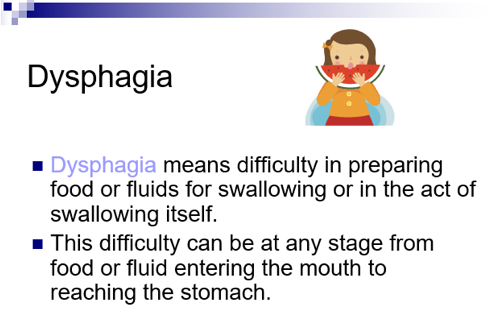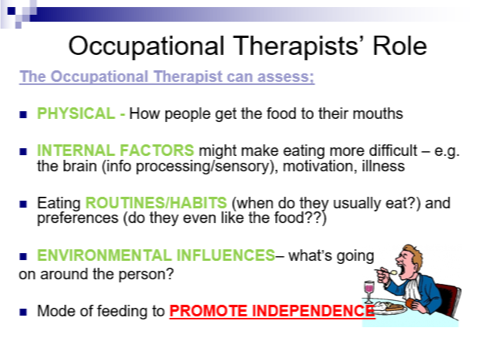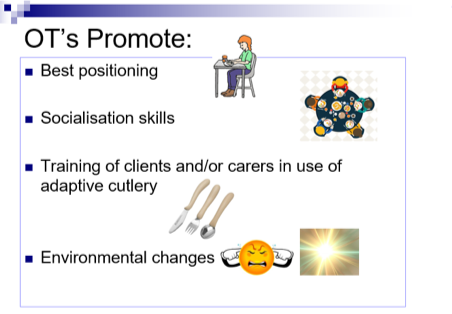By Laura Jones, Occupational Therapist

I haven’t written an article before, but I thought it may be interesting for people to get an insight into a week of the life of an occupational therapist working with adults with learning disabilities in the community! It is a very varied role, no one day is the same and, most of all, it is incredible rewarding and enjoyable. I hope showing you a week in my working life can show you just how rewarding, interesting and varied it can be! All names have been changed for confidentiality purposes.
MONDAY
Independence and routine at work
I attended a meeting at Ellie’s place of work today. Ellie was off work for over a year due to a period of illness and is finding it difficult to get back in to her routine at work since returning. I am working alongside psychology, Ellie’s manager and a HR representative, as well as Ellie and her mother - to gain an understanding of her needs and what the barriers to her engaging in her job role are at present. Ellie has gone back to work on a phased return and is currently doing two short days, which she has never done before. Myself and the psychologist have ascertained that this is totally out of routine as Ellie has always worked part time, and that this may be contributing to her current difficulties, which include being easily distractible and not being able to complete tasks in the allocated time. As Ellie had never done short days prior to this and has been in her job for many years, it was proving difficult for her to solidify this as her routine.

Ellie’s manager showed me the job list expected of Ellie, which has also been provided to her and discussed verbally with Ellie on numerous occasions. The job list was very wordy, and not accessible for Ellie who was struggling to follow this. As a first port of call, I worked with Ellie to develop an easy read checklist that she could use at work, which is comprised of much less words, and pictures to guide her through the jobs she needed to do on a daily basis.

I have talked to Ellie’s employers about the Accessible Information Standard, which aims to make sure that people who have a disability, impairment or sensory loss get information that they can access and understand (NHS England n.d).

We have also discussed the legal requirements for an employer in relation to reasonable adjustments for individuals with a disability, to ensure that they have every opportunity to flourish in their role (GOV.UK 2018). Part of my job is to educate and train others, whether that be someone’s employer, mainstream healthcare services or support staff and carers, to ensure that the information they are providing to individuals with learning disabilities is accessible. Ellie’s employer has asked for some more information to be provided about Ellie’s needs in relation to reasonable adjustments. I have referred Ellie to speech and language therapy for a comprehensive assessment of her communication needs and information processing skills, as we feel this will help us to have an understanding of any reasonable adjustments needed, in more depth.
Meaningful occupation and mental health

Following this I had a joint visit with our OT Technician to see James. James is currently having a relapse of mental health symptoms and is having difficulty with concentration and motivation to engage in meaningful occupations. Myself and the OT Technician went with James to a specialist mental health support day service, at his request, to engage in some activities that he expressed would be of interest to him.

We played several games of pool, which proved quite difficult for James in terms of concentration, due to his current symptoms. We tried some distraction and positive affirmation techniques to try and encourage James to continue and manage his symptoms more effectively. James was clearly finding it difficult to engage in any activities, however we did stay out for longer than he has done in a some time and he stated that he did enjoy the time he spent out and found it to be a positive experience. Myself, James and the OT Technician are working alongside the mental health services in order to ensure he is getting equitable healthcare and the reasonable adjustments he needs in order to access their mainstream service. Our speech and language therapy team have done a comprehensive assessment of James’s communication needs which has been provided to them, with permission from James, to ensure they have a greater understanding of how his learning disability affects his communication and information processing skills.
TUESDAY
Delivering training
Today I delivered the Occupational Therapy section of the Dysphagia training, alongside some of my speech and language therapy colleagues. We deliver this to carers and support workers who are working with individuals with a learning disability and dysphagia. This includes explanation around the role of an occupational therapist in managing dysphagia, how we assess feeding difficulties and tools and techniques around this, including aids, adaptations and equipment and the impact of the environment. We aim to ensure several things through this training, firstly that the individuals with learning disabilities we are working with are safe when eating, whether they receive support with this or are independent. We want support staff to be aware of the signs of dysphagia and ensure that they are aware that we are available to support with this as and when needed. It is also a great opportunity for me to talk about the OT role, as it is often something people do not fully understand or are aware of! On a serious note, it is very important that staff working with individuals with learning disabilities have an understanding of dysphagia and its signs and symptoms, and often these are missed if it is a mild case. Furthermore it is generally accepted that people with a learning disability are more likely to have dysphagia than other group and is a leading cause of death in individuals with a learning disability (Public Health England n.d).
WEDNESDAY
Sensory Assessment

Today I did an initial visit with Mike. Mike was referred to Occupational Therapy due to potential sensory seeking behaviours, such as biting his hand and hitting his face. I met with Mike, an individual with a profound and multiple learning disability, for the first time at his home. I took a long a box of sensory items, and introduced myself to Mike and put the box near where he was sitting to see if he showed any interest in the items. I explained who I was and why I had come to visit him today. I showed Mike several sensory items, such as a massage ‘snake’, bells, cotton wool, light stick and a rain maker among many other items. Mike seemed to respond well to tactile items and also took a lot of items to his mouth, which gave me some idea of his sensory preferences. I then asked Mike if it was okay to ask the support workers some questions about what he likes and doesn’t like. I then completed a sensory profile assessment with Mike and two support staff that know him well, which gave me a comprehensive overview of his sensory needs and preferences, in order for me to make any recommendations going forward to try and reduce any incidents of self harm.
THURSDAY
Cooking Skills and Outcome Measures

Today I saw a married couple, Kate and William, that I have been working with for over a year in order to support them to develop their cooking skills, as they are both underweight and have limited diets. Our work together has involved me doing a cooking assessment and MOHOST. Both the cooking assessment and MOHOST allowed me to identify areas in which they had some difficulties. For example Kate was having difficulties with lifting heavy pans of water, so I put some simple cooking baskets in to place which allowed her to lift the pasta out of the pan without the water. Kate and William also benefitted from a kettle tipper and an electric can opener, as arthritis made these tasks difficult. The main barrier that I identified was lack of confidence in using the oven and cooker, and in particular a fear that they would hurt themselves. Through weekly work on developing their cooking skills around meals they both identified they’d like to be able to make, they began to develop the skills and confidence to cook independently and increase their weight and nutrient intake. We have developed easy read recipes for the chosen meals, and easy read guidelines around using their microwave and timer, and they are now using their microwave independently, and their cooker through the use of these guidelines. Today was the first time I was told I was not needed as they had already made their meal. The words all OT’s want to hear! I repeated the MOHOST as an outcome measure, and it has allowed me to see and document their progress over the last year, with a very positive outcome!

FRIDAY
Eligibility Assessment
Today myself and one of the Learning Disability nurses went on a joint visit to complete an eligibility assessment. We use the Adaptive Behaviour Assessment System 3 (ABAS-3) to determine if an individual that has never received support from us is eligible for our service. To be eligible, one must have an IQ under 70, have significant impairment of social and adaptive functioning, with this having occurred prior to the age of 18. ABAS-3 is a rating scale useful for assessing skills of daily living in individuals with developmental delays, autism spectrum disorder, intellectual disability, learning disabilities, neuropsychological disorders, and sensory or physical impairments (Academic Therapy Publications 2018). We usually do this with the individual and will ask a family member of carer to also complete one, to ensure we have a well-rounded understanding of the individual and their function. We will then correlate the results to determine whether the individual is eligible for our service. On occasion, it may be difficult to determine from the ABAS-3, or results may be borderline, and we will look to do further assessments to ascertain an individuals’ level of need.
References
Academic Therapy Publications (2018) Adaptive Behaviour Assessment System 3 Comprehensive Kit [online]. Available from http://www.academictherapy.com/detailATP.tpl?eqskudatarq=DDD-1934 [30 July 2018].
Growing up Autism and Sensory Processing Disorder (2017) The seven senses and sensory diets [online]. Available from http://growupspd.blogspot.com/2015/05/the-seven-senses-and-sensory-diets.html [7 July 2018].
GOV.UK (2018) People with learning disabilities: making reasonable adjustments [online]. Available from https://www.gov.uk/government/publications/reasonable-adjustments-for-people-with-learning-disabilities [30 July 2018].
NHS England (n.d) Accessible Information Standard [online]. Available from https://www.england.nhs.uk/ourwork/accessibleinfo/ [30 July 2018].
Public Health England (n.d) Swallowing difficulties (dysphagia) [online]. Available from https://www.gov.uk/government/publications/reasonable-adjustments-for-people-with-learning-disabilities/swallowing-difficulties-dysphagia [20 July 2018].
.jpg)







Love this Laura ❤️
As an aspiring OT, I appreciate any shared insight from OT professionals into their daily work. Thank you for sharing your experiences!
What an interesting week Laura, lovely to hear you are doing so well.